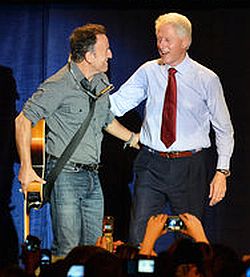With work toward the 2016 presidential election well under way, political controversy, both between the politicians themselves and with outside figures, is bound to become a large part of the news. In September, for example, TPM published an article about Donald Trump and Senator Ted Cruz using REM’s song “It’s the End of the World As We Know It (And I Feel Fine),” as well as lead singer Michael Stipe’s reaction. Listen to the song here:
This story, and others similar to it, got us thinking over at CAAD about the relationship between music and political campaigns. Knowing that professor Justin Patch is teaching a course this spring titled Hearing Politics: The Sound of the 2016 Campaign, I decided to interview him on his thoughts about this particular issue. Listen what he had to say about Trump’s use of the REM song specifically, as well as the root of Stipe’s problem with it.
What Patch is ultimately suggesting is that artists have only started fighting back against politicians trying to use their work within the last thirty years. While he points out that there is an issue of intellectual property involved, there is another facet to music and politics that makes artists such as the Dropkick Murphys, Nancy Wilson, and Rage Against the Machine wary of letting their work be associated with a political campaign. Listen to his explanation.
What is the appeal of certain music, not only for one’s own pleasure, but for uses such as in a political campaign? For example, New Jersey Governor Chris Christie is a self-proclaimed Bruce Springsteen fan, and has made references to his music several times in a public context. Patch speculates why here.
What is interesting, however, is the range of politicians that have used the same song to promote different ideas and values. Springsteen’s “Born in the USA,” for example, has been used famously by Ronald Reagan, but also more recently by Barack Obama.
Are politicians simply not reading deeply enough into the lyrics of these songs, or does popular music have some other quality to it that transcends semantics in lyrics? Patch has an answer.
Just as artists are cautious about aligning themselves with politicians, many politicians are afraid of associating themselves with certain artists. Now that Christie is running for president, he seems to be monitoring how he relates himself to other figures. In a recent interview he claimed that he preferred Bon Jovi over Springsteen. In this way, it seems as though popular artists can in fact have an influence over politicians, particularly in the age of social media. Patch has some interesting thoughts.
In many ways, political campaigns are, as Patch describes them, “popularity contests.” The more “popular” people you can get to join your campaign, the more successful it will be, and this has been seen throughout history, as Patch explains.
To close, Patch reflects on the importance of sound in a political campaign, both in terms of music and other forms of sound, which will be explored in his course next spring. Listen for more information.
Special thanks to Professor Justin Patch for participating in this interview! MUSIC-180, Hearing Politics: The Sound of the 2016 Campaign will be offered this spring and satisfies the freshman writing seminar requirement.

